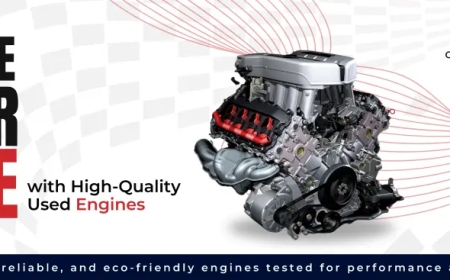Engine Recondition Explained: What Car Owners Need to Know
Learn what engine reconditioning means, its benefits, costs, and how it compares to replacements. A must-read guide for every car owner and enthusiast.

When your car starts showing signs of engine trouble, youre often faced with a difficult decision: repair, replace, or recondition? While replacing an engine might seem like the most reliable solution, its often expensive and unnecessary. This is where engine reconditioning becomes a smart and cost-effective option. But what exactly is engine reconditioning? How does it differ from a repair or replacement? And most importantly, is it the right choice for your vehicle?
In this guide, well explore everything car owners need to know about engine reconditioningfrom its process and benefits to costs and what to expect.
What Is Engine Reconditioning?
Engine reconditioning, also known as engine rebuilding or refurbishment, involves restoring an existing engine back to its original working condition or better. Its more comprehensive than a simple repair but less drastic than a full engine replacement.
The reconditioning process includes disassembling the engine, inspecting all components, replacing worn or damaged parts, and cleaning or machining parts to restore performance. The goal is to bring the engine back to optimal functionality, improving both performance and longevity.
Signs You Might Need Engine Reconditioning
Before committing to a reconditioned engine, its essential to know the warning signs that your current engine may be failing. These include:
-
Excessive smoke from the exhaust (blue, white, or black)
-
Knocking or rattling noises from the engine
-
Loss of power or sluggish performance
-
Increased oil or coolant consumption
-
Metal shavings in engine oil
-
Frequent overheating
-
Check engine light that wont go away
If your car exhibits any of these symptoms, its crucial to have a professional mechanic perform a diagnostic. In many cases, reconditioning might be the best course of action.
The Engine Reconditioning Process: Step-by-Step
1. Initial Diagnosis and Inspection
The first step is a thorough diagnostic to assess the overall condition of the engine. This helps determine whether reconditioning is viable or if a replacement is needed.
2. Engine Disassembly
Once approved, the engine is removed from the vehicle and disassembled completely. Every part is catalogued and inspected individually.
3. Cleaning and Machining
Parts such as the engine block, cylinder head, and crankshaft are chemically cleaned and machined. Machining may include:
-
Reboring cylinders
-
Resurfacing the cylinder head
-
Grinding the crankshaft
-
Replacing valve guides and seals
4. Replacement of Worn Parts
Critical components that are worn beyond specificationlike pistons, rings, bearings, gaskets, and timing componentsare replaced with new or refurbished parts.
5. Reassembly
Once all parts are cleaned and replaced, the engine is reassembled with high precision. Special attention is paid to torque settings, timing, and seals to ensure factory-level performance.
6. Testing and Quality Control
The reconditioned engine undergoes rigorous bench testing (and sometimes dynamometer testing) to ensure all systems function properly.
Benefits of a Reconditioned Engine
? Cost-Effective Alternative
Reconditioning is typically 3050% cheaper than buying a brand-new engine, making it a cost-effective solution for many car owners.
? Extends Vehicle Life
A reconditioned engine can extend the life of your vehicle by tens of thousands of miles when maintained properly.
? Improved Performance
Performance can return to near-new levels, including better fuel efficiency, smoother idling, and quicker acceleration.
? Environmentally Friendly
Reconditioning reuses many original engine parts, reducing the need for manufacturing new componentsmaking it a greener choice.
? Warranty Options
Many reputable garages and engine specialists offer warranties ranging from 6 to 24 months on reconditioned engines.
Engine Reconditioning vs. Replacement vs. Repair
| Factor | Reconditioning | Replacement | Repair |
|---|---|---|---|
| Cost | Moderate | High | Low to Moderate |
| Performance | Near-new | Brand-new | Varies |
| Time Required | 12 weeks | 12 weeks | 15 days |
| Warranty | Yes (624 months) | Yes (13 years) | Often limited |
| Sustainability | Environmentally friendly | Less sustainable | Depends on parts used |
When to Recondition:
-
Engine damage is significant but localized
-
You want a reliable and long-term solution
-
Budget is important, but you still want quality
Whats the Cost of Engine Reconditioning?
Prices vary depending on the vehicle make, engine type, and extent of work required. On average, you can expect:
-
4-cylinder engine: $1,200 $2,500
-
6-cylinder engine: $2,000 $3,500
-
V8 engine or diesel: $3,000 $5,000+
These prices typically include labor, parts, and testing. Its important to get a detailed quote and ask whether the cost includes a warranty and diagnostics.
Questions to Ask Before Choosing Engine Reconditioning
-
Do you offer a written warranty?
-
What parts will be replaced or reused?
-
How long will the reconditioning take?
-
Are the components OEM or aftermarket?
-
Will you provide documentation for all work done?
-
Is testing included in the final cost?
Asking these questions helps ensure transparency and confidence in the work being done.
Risks and Limitations
While engine reconditioning is a reliable solution for many, its not without its limitations:
-
Not Suitable for Severely Damaged Engines: If the engine block is cracked or warped, reconditioning may not be viable.
-
Requires Skilled Technicians: Quality depends heavily on the experience of the engine reconditioner.
-
Not Always Cheaper Long-Term: If other parts of the car are also nearing end-of-life, it may be better to replace the entire vehicle.
Maintenance Tips After Engine Reconditioning
To ensure the longevity of a reconditioned engine, follow these key maintenance practices:
-
Use high-quality engine oil and change it regularly (every 3,0005,000 miles).
-
Check coolant and fluid levels weekly.
-
Avoid hard acceleration during the break-in period (usually the first 1,000 miles).
-
Listen for unusual noises or vibrations.
-
Schedule regular inspections with your mechanic.
These habits can significantly enhance the performance and life of your reconditioned engine.
Real-World Examples
? Case Study 1: Ford Focus 1.6L Petrol
A customer experiencing oil burning and poor mileage opted for a full reconditioning. After 10 days and $1,800, the engine was restored with new piston rings, bearings, and a skimmed head. The result? A car running like new with improved fuel economy.
? Case Study 2: BMW 320d Diesel
A seized turbo caused significant engine damage. Rather than replace the entire engine at a cost of $6,000, the owner chose reconditioning for $3,200. All critical internals were replaced, and the car now performs flawlessly with a 12-month warranty.
Conclusion
Engine reconditioning is an excellent middle-ground solution for car owners facing serious engine issues. It balances cost, reliability, and performance, offering a second life to your vehicle without the hefty price tag of a new engine. Whether youre looking to hold on to your car a little longer or restore its performance to near-new levels, reconditioning is an option worth considering.
Always consult with a qualified technician, get a detailed quote, and compare it with other alternatives before making your final decision. With the right team and approach, engine reconditioning can deliver excellent value and peace of mind.



































